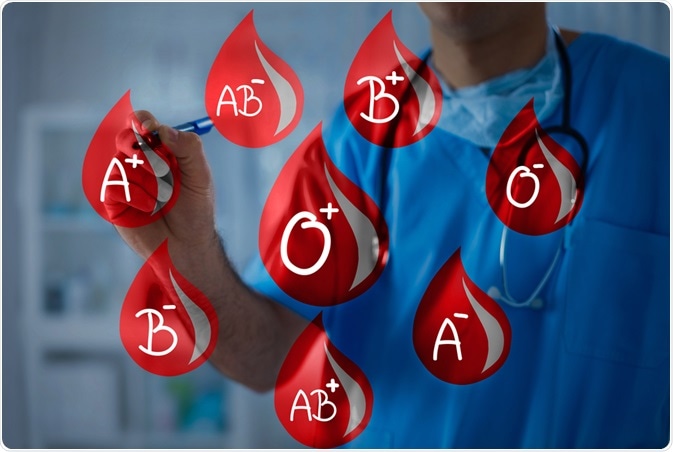There are several different ways in which an individual’s blood type can be categorized. This article will provide a comprehensive review of the major blood group systems and their role in human health and disease.

Image Credit:
Blood group systems
A blood group is defined as the entire blood group system that is made up of red blood cell (RBC) antigens. Taken together, the specificity of RBC antigens is controlled by a series of either allelic or linked genes that are present on the same chromosome.
To date, 33 different blood group systems representing more than 300 different RBC antigens have been identified and described by the International Society of Blood Transfusion. Some of the most important blood group systems include ABO, MNS, Rhesus (Rh), Lutheran (LU), Kell (KEL), Lewis (LE), Duffy (FY), and Kidd (Jk) systems.
The ABO blood group
Among the 33 systems, the ABO blood group system, which was originally discovered in 1901, is considered to be the most important in terms of transfusion treatments and organ transplantations. The three main alleles that make up the ABO blood group system include two co-dominant A and B alleles, as well as one recessive O allele.
Each of the three alleles of the ABO system is controlled by a single gene that is present on the terminal portion of the long arm of chromosome 9 known as 9q34.2.
While there are subtle differences between the glycosyltransferases that both the A and B alleles encode for, both of these enzymes function by adding N-acetylgalactosamine and D-galactose to an H-antigen, which is a precursor side chain that will be subsequently transformed into either the A or B antigen.
As compared to the co-dominant alleles, the O allele does not encode for any transferase enzyme, which causes these carriers to instead express the unmodified H-antigen.
ABO blood types
The three alleles of the ABO blood system can generate four different major phenotypes, which are otherwise referred to as an individual’s blood type. These four different blood types, which include A, B, AB, and O, are characterized by the presence or absence of A and/or B antigens on the surface of RBCs.
Individuals with the A blood type, for example, will have A antigens present on the surface of their RBCs along with anti-B antibodies present in their plasma. Similarly, individuals with the B blood type will have B antigens present on the surface of their RBCs, along with anti-A antibodies in their plasma.
Although individuals who are O blood type carriers have neither A nor B antigens present on the surface of their RBCs, these individuals have both anti-A and anti-B antibodies present within their plasma. Since individuals with the AB blood type have both A and B antigens present on the surface of their RBCs, these individuals will not have any antibodies against either antigen present within their plasma.
In addition to their expression on the surface of RBCs, ABO antigens are also widely expressed on the surfaces of different cells and tissues throughout the body, as well as throughout different body fluids. For example, ABO antigens are present on epithelial cells, sensory neurons, platelets, and the endothelium that lines blood vessels.
The RBO system therefore not only is critical for both transfusion and transplantation medicine but has also been studied for its role in the pathogenesis of various cardiovascular, neoplastic, and various other health disorders.
The Rhesus system
Following the ABO blood group system, the Rh system is considered to be the second most important blood group system. The Rh system is made up of 50 different blood group antigens, of which five are considered to be significant for human health.
An individual’s Rh status is determined by the presence or absence of the Rh factor, which is an immunogenic D-antigen. Therefore, individuals who are Rh-positive will have the D-antigen present on the surface of their RBCs, whereas individuals who are Rh-negative will not have the D-antigen.
As compared to the ABO blood group system in which antibodies against the alternative antigens are present within the plasma, Rh-negative individuals will not, under normal circumstances, have anti-Rh antibodies present within the plasma. However, if the circulatory system of an Rh-negative individual has been exposed to D-positive RBCs, anti-Rh antibodies will enter the circulation.
Pregnant Rh-negative mothers who have given birth to an Rh-positive child will be given prophylactic treatment in the form of anti-D IgG to prevent these anti-D antibodies from crossing the placenta and harming the fetus.

Image Credit: Betty Ray/Shutterstock.com
References and Further Reading
Last Updated: Oct 26, 2020